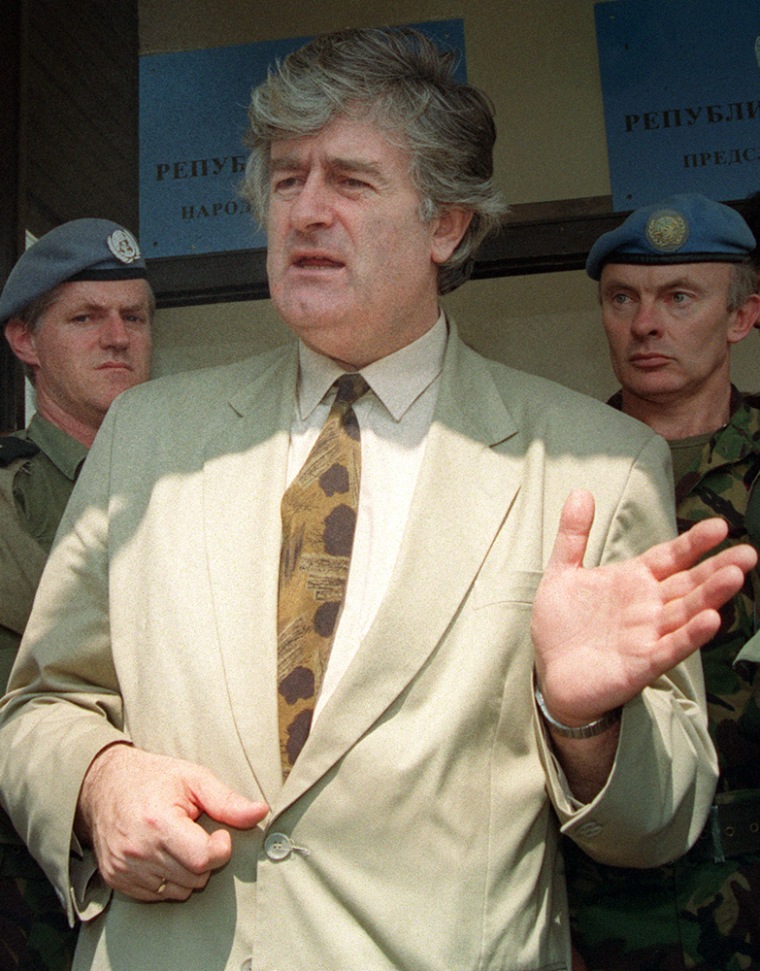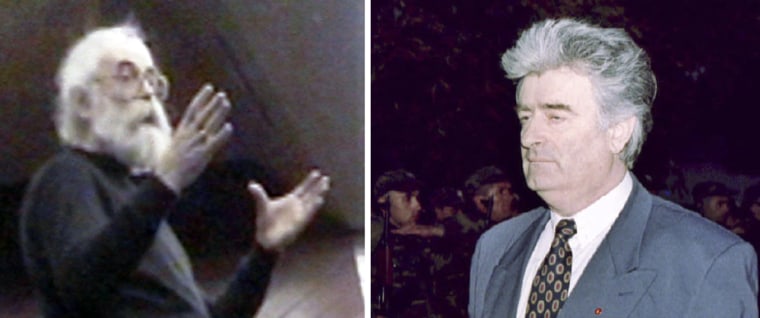Bosnian Serb wartime president Radovan Karadzic, one of the world's most wanted war crimes fugitives, was arrested near Belgrade after 11 years on the run, in disguise and working as a doctor.
Serbian officials said Tuesday Karadzic was arrested near Belgrade. They showed reporters a photograph of an unrecognizable Karadzic, thin and with a long, white beard and flowing hair.
He was working for a private doctor, posing as a specialist in alternative medicine, said Rasim Ljajic, Serbia's point man for cooperation with The Hague war crimes tribunal.
"He happily, freely walked around the city," Serbia's war crimes prosecutor Vladimir Vukcevic told reporters. "Even the people he rented a flat from were unaware of his identity."
Vukcevic said Karadzic, the accused mastermind of Europe's worst massacre since World War II, has refused to communicate with his captors.
In a terse statement on Monday, Serbian President Boris Tadic confirmed that Karadzic had been detained.
Karadzic, 63, was wanted for genocide and crimes during the Bosnian war. He was charged by the U.N. tribunal with organizing the deadly siege of Sarajevo and the 1995 massacre of up to 8,000 Muslims in Srebrenica.
People poured in celebration onto the streets of Sarajevo, the Bosnian capital which Karadzic's troops shelled mercilessly in a 43-month siege during the 1992-95 Bosnian war.
"I called and woke up my whole family," said Sarajevo resident Fadil Bico as cars honked horns and Bosnian state radio played excerpts of Karadzic's wartime hate speeches.
Serbian government sources said Karadzic had been under surveillance in Serbia for several weeks after a tip-off from a foreign intelligence service.
'Architect of mass murder'
Karadzic was indicted along with his army commander, Gen. Ratko Mladic, for genocide at Srebrenica, where some 8,000 unarmed Bosnian Muslim males were rounded up, murdered and bulldozed into mass graves in July 1995.
He is also charged with authorizing the shooting of civilians during the Sarajevo siege in which an estimated 11,000 people were killed.
Richard Holbrooke, former U.S. Balkan troubleshooter during the wars of the 1990s, described Karadzic as the Osama bin Laden of Europe, "a real, true architect of mass murder."
Karadzic went underground more than a year after Holbrooke negotiated the 1995 Dayton accords that ended the war in Bosnia and following the deployment of a huge force of NATO peacekeepers.

Vukcevic said a judge has ordered his transfer to the U.N. war crimes court in The Hague, Netherlands, to face genocide charges.
Karadzic has three days to appeal the ruling. His lawyer Sveta Vujacic said Karadzic will launch the process to fight extradition.
Karadzic's whereabouts had been a mystery, with his hideouts reportedly including monasteries and mountain caves in remote eastern Bosnia. Some newspaper reports said he had at times disguised himself as a priest by shaving off his trademark silver mane and donning a brown cassock. Others said he wore women's wigs.
Serbian security services found Karadzic while looking for another top war crimes suspect, Gen. Ratko Mladic, Ljajic said.
"He was arrested Monday evening near Belgrade while changing locations," he said.
Ljajic said Karadzic — once known for his distinctively coifed hairdo — was unrecognizable with his long mane, beard and glasses.
"His false identity was very convincing," Vukcevic said. "Even his landlords were unaware of his identity."
Serbia has been under intense pressure from the European Union to turn over suspects from the siege, but Karadzic's arrest came as a surprise to many. One reason may be that nationalists lost power in Serbia when a new pro-Western government took over last month.
The tribunal has described him as the suspected mastermind of "scenes from hell, written on the darkest pages of human history." Prosecutors suspected he eluded the manhunt with the help of Bosnian Serb nationalists and a string of elaborate disguises.
"This is a very important day for the victims who have waited for this arrest for over a decade," the tribunal's head prosecutor, Serge Brammertz, said. "It clearly demonstrates that nobody is beyond the reach of the law and that sooner or later all fugitives will be brought to justice."
Journalists attacked
Late Monday, heavily armed special forces of the Serbian Gendarmerie were deployed around the war-crimes court in Belgrade — apparently fearing a backlash from nationalists who consider Karadzic their war hero.
"He did not surrender; that is not his style," his brother, Luka Karadzic, said outside the court.
Dozens of Karadzic supporters gathered near the building chanting "Karadzic Hero!" and "Tadic Traitor!" Several were arrested after attacking reporters in front of the courthouse.
Other officers took up positions throughout central Belgrade and in front of the U.S. Embassy, which was targeted in nationalist rioting over Kosovo's declaration of independence in February.
In the Bosnian capital, Sarajevo, which was besieged throughout the war by Bosnian Serb nationalists, streets were jammed late Monday as Bosnian Muslims celebrating the arrest.
During the siege of Sarajevo, the Serbs starved, sniped and bombarded the center of Sarajevo, operating from strongholds in Pale and Vraca high above the city and controlling nearly all roads in and out.
Inhabitants were kept alive only by a thin lifeline of food aid and supplies provided by U.N. donors and peacekeepers, and risked their lives merely walking down the street, shopping in a market or driving on one of the main roads, which became known as "Sniper Alley."
The siege, which began in April 1992, was not officially lifted until February 1996, after NATO intervention and the implementation of the Dayton Peace Accords. During that time, an estimated 10,000 people died in and around the city.
Self-styled poet
The international tribunal indicted Karadzic on genocide charges in 1995. The psychiatrist and self-styled poet turned hard-line Serbian nationalist still wielded power among Bosnian Serbs from the shadows and occasionally appeared in public before he went on the run in 1998.
Munira Subasic, a mother who lost two sons in the Srebrenica massacre, was overcome with emotion as she watched the news on television.
"After 13 years, we finally reached the moment of truth," she told AP Television News. If Karadzic is extradited to the tribunal in The Hague, he would be the 44th Serb suspect sent there. The others include former President Slobodan Milosevic, who was ousted in 2000 and died in 2006 while on trial on war crimes charges.
A statement from the EU presidency, currently held by France, called the arrest "an important step on the path to the rapprochement of Serbia with the European Union."
Born in Savnik, Yugoslavia, in what is now the Republic of Montenegro, Karadzic became a founding member of the Serbian Democratic Party in Bosnia-Herzegovina in 1990. Two years later, he was elected president of the three-person presidency of the Serbian republic in Bosnia, which had just been freshly recognized as an independent state by the United Nations.
He became sole president of the Serb Republic in Bosnia that year, remaining in that position until 1996 and also serving as supreme commander of the armed forces.
As leader of Bosnia's Serbs, Karadzic hobnobbed with international negotiators and his interviews were top news items during the 3 1/2-year Bosnian war, set off when a government dominated by Slavic Muslims and Croats declared independence from Yugoslavia in 1992.
His indictment alleges that he, acting together with others, committed the crimes to secure control of areas of Bosnia which had been proclaimed part of the "Serbian Republic" and significantly reducing its non-Serb population.
His life changed by the time the war ended in late 1995 with an estimated 250,000 people dead and another 1.8 million driven from their homes. He was indicted twice by the U.N. tribunal on genocide charges stemming from his alleged crimes against Bosnia's Muslims and Croats.
His wife, Ljiljana, told The Associated Press by phone from her home in Karadzic's former stronghold, Pale, near Sarajevo that her daughter Sonja had called her before midnight.
"As the phone rang, I knew something was wrong. I'm shocked. Confused. At least now, we know he is alive," Ljiljana Karadzic said, declining further comment.
Under the U.N. indictment, last amended in May 2000, the U.N. war crimes tribunal charged Karadzic with 11 counts of genocide, war crimes, crimes against humanity and other atrocities committed between 1992 to 1996.
It would almost certainly take many months for Karadzic to stand trial due to the complexity of his case, expected legal wrangling and a packed docket.
In the past, the court has sometimes released suspects under strict conditions to await trial in their home country. However there is virtually no chance that will happen in Karadzic's case.
